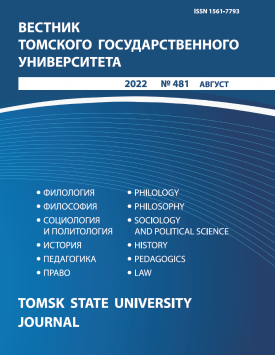Political ecology as a project: Between ideology and political religion
The emergence of political ecology is associated with the division of public consciousness and political communities into opposing currents in an attempt to find a way out of the impasse of the ecological crisis. The concept of political ecology can manifest itself in various forms of knowledge as relatively independent entities: as a political theory, as a political ideology, as a political religion. The ambiguity of the content of political ecology is connected with the variety of contexts in which the problem of the ecological crisis is considered. The aim of the study is to identify the features of political ecology as a theory and the stages of its formation, as well as the features of ecological ideology and ecological political religion. The subject of the study is the forms of manifestation of political ecology, their difference and unity. The research is based on the materials of ideological concepts, religious doctrines, political theories. The methodological basis of the research is a critical approach, which organically follows from the understanding of political ecology as a critical theory. A systematic approach and comparative analysis make it possible to study various forms of manifestation of political ecology as a complex phenomenon. The ecological crisis has become a source of emerging social anomie in the form of a conflict of old and new values. The central value of ideology becomes “ecocentrism”, opposing “anthropocentrism”. Ecological ideology is based on the theoretical analysis of modernity, constructs a chiliastic eschatology that describes the “end of history”. Its focus is to maintain the mobilization potential for legitimising the bearers of the new system of values. Political ecology as a political religion is based on the belief in the divinity of nature, from which the sacred character of the entire sphere of the political follows. Politics and political institutions act as practices which resist the forces that destroy nature and which correlate with forms of worship that provide a way to save humanity. The focus for political religion, in comparison with theoretical argumentation and the system of values, remains the world as a structure of human connection, through faith, with the sacred essence of nature. The core of political ecology is critical political theory as a project aimed at finding compromises in resolving the ecological crisis. The opposite principles of anthropocentrism and ecocentrism find synthesis in the concept of co-evolution. Political ecology at the third stage of its development makes ecological ideology and political religion the subjects of research, introducing them into its system as moments. It is possible to distinguish three stages in the development of political ecology from the side of form: from the concept, through the relatively autonomous existence of various dimensions, to the systemic integrity of all components on the basis of the political-theoretical dimension.
Keywords
ecological crisis, political ecology, ecocentrism, co-evolutionAuthors
| Name | Organization | |
| Volkov Vitaly A. | Saint Petersburg State University | v.a.volkov@spbu.ru |
References

Political ecology as a project: Between ideology and political religion | Vestnik Tomskogo gosudarstvennogo universiteta – Tomsk State University Journal. 2022. № 481. DOI: 10.17223/15617793/481/9
